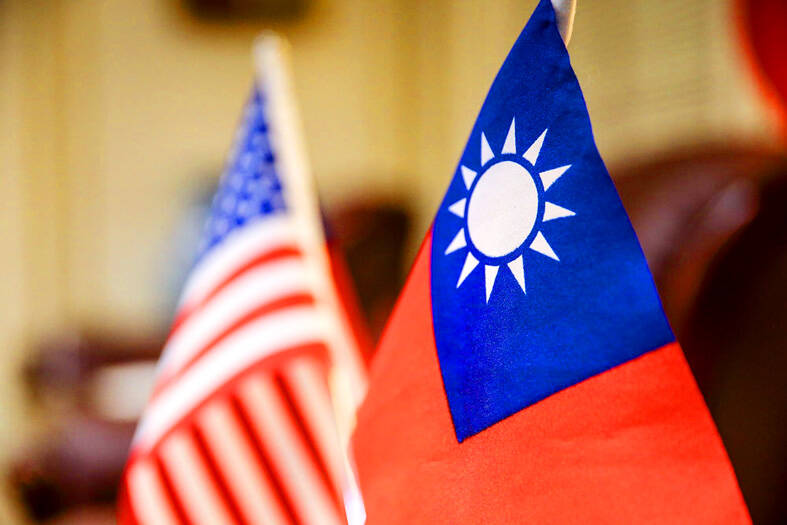A bipartisan group of US senators last week introduced a bill to sanction Beijing if it wages war against Taiwan.
The bill would oblige Washington to impose sanctions on China should the US president determine that Beijing or any of its proxies has launched a military invasion of Taiwan, the lawmakers said.
US senators Tammy Duckworth and Dan Sullivan, a Democrat and Republican respectively, jointly sponsored the draft act entitled the “sanctions targeting aggressors of neighboring democracies (STAND) with Taiwan act of 2024.”

Photo: Cheng I-hwa, Bloomberg
The bill is to be deliberated by the US Senate Committee on Armed Services.
The bill stipulates a comprehensive package of sanctions that would block Chinese Communist Party (CCP) members and Chinese financial and industrial institutions from making transactions with US-based financial institutions, Sullivan’s office said in a statement.
US financial institutions — banks, private equity firms, venture capital groups and hedge funds — would be barred from making any investment that benefits the CCP and its affiliates, while the bill also places restrictions on the importation of goods manufactured in China, it said.
“It is critical that America show steady, unwavering bipartisan commitment and resolve in support of Taiwan’s democracy,” Sullivan was quoted as saying. “Every day, the CCP grows bolder and more aggressive in its threats against Taiwan, the United States and our allies in the Indo-Pacific.”
“I have always believed that if America wants to remain a global leader, we have to show up and support our friends like Taiwan,” the Republican senator’s statement quoted Duckworth as saying.
Taiwan is “a partner that our nation has strong economic and military ties with, who are facing escalating threats from the People’s Republic of China as they work to strengthen their own democracy,” she said.
Sullivan and Duckworth told Taiwanese officials about the bill in May during their visit to Taiwan at the head of a congressional delegation, which additionally included US senators Chris Coons and Laphonza Butler.
Sullivan and fellow Republican US Senator Roger Marshall first introduced a STAND with Taiwan act in 2022.

CHAOS: Iranians took to the streets playing celebratory music after reports of Khamenei’s death on Saturday, while mourners also gathered in Tehran yesterday Iranian Supreme Leader Ayatollah Ali Khamenei was killed in a major attack on Iran launched by Israel and the US, throwing the future of the Islamic republic into doubt and raising the risk of regional instability. Iranian state television and the state-run IRNA news agency announced the 86-year-old’s death early yesterday. US President Donald Trump said it gave Iranians their “greatest chance” to “take back” their country. The announcements came after a joint US and Israeli aerial bombardment that targeted Iranian military and governmental sites. Trump said the “heavy and pinpoint bombing” would continue through the week or as long

TRUST: The KMT said it respected the US’ timing and considerations, and hoped it would continue to honor its commitments to helping Taiwan bolster its defenses and deterrence US President Donald Trump is delaying a multibillion-dollar arms sale to Taiwan to ensure his visit to Beijing is successful, a New York Times report said. The weapons sales package has stalled in the US Department of State, the report said, citing US officials it did not identify. The White House has told agencies not to push forward ahead of Trump’s meeting with Chinese President Xi Jinping (習近平), it said. The two last month held a phone call to discuss trade and geopolitical flashpoints ahead of the summit. Xi raised the Taiwan issue and urged the US to handle arms sales to

State-run CPC Corp, Taiwan (CPC, 台灣中油) yesterday said that it had confirmed on Saturday night with its liquefied natural gas (LNG) and crude oil suppliers that shipments are proceeding as scheduled and that domestic supplies remain unaffected. The CPC yesterday announced the gasoline and diesel prices will rise by NT$0.2 and NT$0.4 per liter, respectively, starting Monday, citing Middle East tensions and blizzards in the eastern United States. CPC also iterated it has been reducing the proportion of crude oil imports from the Middle East and diversifying its supply sources in the past few years in response to geopolitical risks, expanding

An Emirates flight from Dubai arrived at Taiwan Taoyuan International Airport yesterday afternoon, the first service of the airline since the US and Israel launched strikes against Iran on Saturday. Flight EK366 took off from the United Arab Emirates (UAE) at 3:51am yesterday and landed at 4:02pm before taxiing to the airport’s D6 gate at Terminal 2 at 4:08pm, data from the airport and FlightAware, a global flight tracking site, showed. Of the 501 passengers on the flight, 275 were Taiwanese, including 96 group tour travelers, the data showed. Tourism Administration Deputy Director-General Huang He-ting (黃荷婷) greeted Taiwanese passengers at the airport and